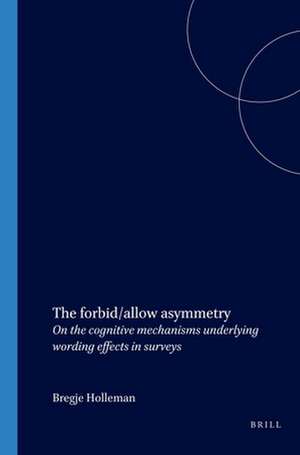The forbid/allow asymmetry: On the cognitive mechanisms underlying wording effects in surveys: Utrecht Studies in Language and Communication, cartea 16
Autor Bregje Hollemanen Limba Engleză Paperback – 31 dec 1999
This book is the first to apply a systematic cognitive approach to describe the causes of the forbid/allow asymmetry. The question-answering process is unravelled by a variety of experiments and meta-analytic techniques. Analyses reveal that the difference in question wording does not prompt respondents to retrieve different attitudes. Instead, the asymmetry reflects that the question wording causes the response options to be used differently. Because of the qualifying dimensions in the question text, the meanings of ‘yes’ and ‘no’ change, as well as the cognitive distance between them.
This study sheds a different light on processes of question-answering and text interpretation. Furthermore, practical advice on questionnaire design and on the interpretation of survey data is given on the basis of these new insights.
Preț: 346.10 lei
Nou
Puncte Express: 519
Preț estimativ în valută:
66.23€ • 71.92$ • 55.64£
66.23€ • 71.92$ • 55.64£
Carte indisponibilă temporar
Doresc să fiu notificat când acest titlu va fi disponibil:
Se trimite...
Preluare comenzi: 021 569.72.76
Specificații
ISBN-13: 9789042013414
ISBN-10: 9042013419
Dimensiuni: 150 x 220 mm
Greutate: 0.44 kg
Editura: Brill
Colecția Brill
Seria Utrecht Studies in Language and Communication
ISBN-10: 9042013419
Dimensiuni: 150 x 220 mm
Greutate: 0.44 kg
Editura: Brill
Colecția Brill
Seria Utrecht Studies in Language and Communication
Recenzii
"The argument is both intricate and abstract. But those who persevere will have been thoroughly awakened to important issues about this question wording effect, about response effects more generally, and about the possibility of imaginative designs to increase our understanding in this area. They will also be introduced to a talented methodologist who is likely to make important contributions in the future." - in: Public Opinion Quarterly, Vol. 65, No. 1 (Spring 2001)
"Holleman applies a systematic cognitive approach … The book delves into the circumstances under which the asymmetry occurs; it also examines the extent and nature of how responses are distorted by the choice of the verb ‘forbid’ or ‘allow.’" - in: International Journal of Public Opinion Research, Vol. 13, No. 1 (2001)
"Holleman applies a systematic cognitive approach … The book delves into the circumstances under which the asymmetry occurs; it also examines the extent and nature of how responses are distorted by the choice of the verb ‘forbid’ or ‘allow.’" - in: International Journal of Public Opinion Research, Vol. 13, No. 1 (2001)
Cuprins
Chapter 1 A cognitive perspective on the forbid/allow asymmetry. Chapter 2 The state of the art in forbid/allow research. Chapter 3 Generalizing the asymmetry beyond question level. Chapter 4 Attitude retrieval versus mapping an answer. Chapter 5 The communicative setting as an influencing factor. Chapter 6 Communicative restrictions and the answering scales. Chapter 7 The relative meanings of yes and no. Chapter 8 On cognitive mechanisms underlying wording effects. References. Concise subject index. Author index.















